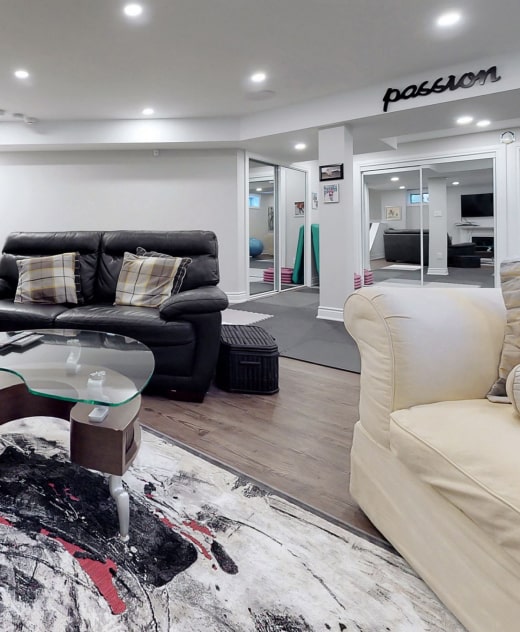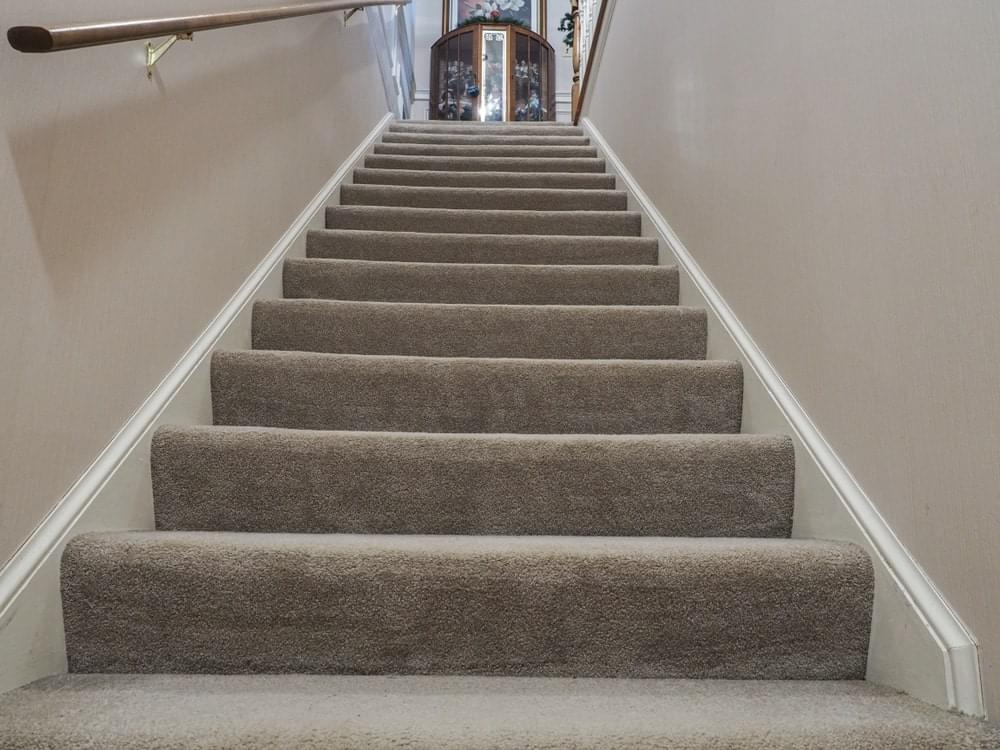What Is an Ideal Basement Humidity in Summer?
Basement humidity is a common issue during Toronto summers because the city has a warm, humid climate. Warm air that comes from outside often carries excess moisture into basement environments that are cooler and tends to condense on pipes, walls, and even floors. Without adequate dehumidification, the moisture builds up quickly, further increasing humidity levels.
At CSG Renovation, we are experienced in basement renovations and ensuring any underlying humidity problems are assessed and resolved. In over a decade of working on basement remodeling in Toronto, we’ve seen how controlling humidity levels is essential for long-term basement health:
- It directly prevents mildew and mold growth, which thrive when relative humidity consistently exceeds 60%.
- It also helps preserve structural integrity and protects electrical and HVAC systems while ensuring their performance is preserved and premature replacement costs are reduced.
This article focuses on the importance of humidity control in basements, the best basement humidity in summer, ways of measuring humidity levels, and when to contact experts to help out.
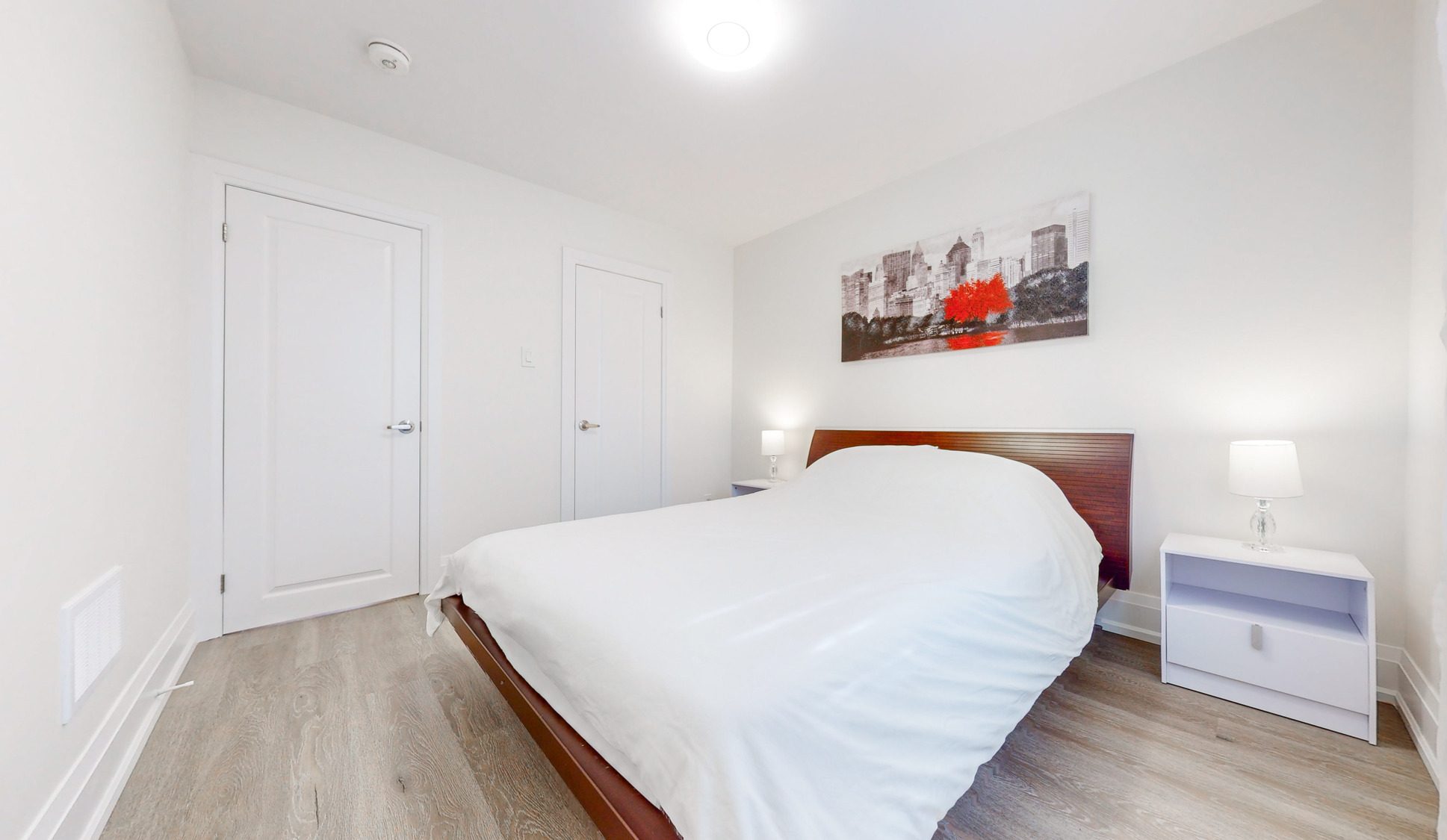
Why Humidity Control in the Basement Matters
Unlike upper sections or floors of a home, the below-ground level location of basements creates constant contact with soil moisture especially during humid seasons like summer hence increasing the likelihood of wet basement and potential water seepage.
Poor basement ventilation is another reason why humidity control matters. The windows in basements are often small or absent altogether, and the airflow is limited. This means that the moisture that enters the basement space through condensation, seepage, and everyday activities such as laundry has nowhere to escape.
As time goes by, that moisture accumulates and ends up raising the relative humidity, which may lead to issues such as the following:
- Mold and mildew: When the humidity exceeds 60% the basement becomes a prime breeding ground for mildew and mold, appearing mostly on flooring, stored items like furniture, boxes, drywall, and wood framing.
- Structural damage from humidity: Concrete may develop cracks due to water repeatedly entering and drying, metal fasteners corrode, hence compromising the joints they hold together, and wood may absorb the excess moisture, leading to foundation damage from humidity, warping, rot, and loss of load-bearing strength.
- Poor indoor air quality: When the humidity levels are too high, warm air rises, pulling cooler, denser air from the basement upward. This means that humid air, along with dust mites, volatile organic compounds, and mold spores, may rise through HVAC systems or stairwells into the rest of the home, leading to asthma, allergy, and health complications.
- Musty smells: High basement humidity may cause porous material such as drywall, upholstery, carpet, and wood to trap moisture, which over time leads to musty, stale odors.
Our basement renovation company has regularly encountered these conditions in the homes we work on, and our experts are committed to fighting basement humidity, ensuring that they treat humidity control as a foundational step in any successful basement renovation in Toronto, especially if you’re interested in a legal second suite.
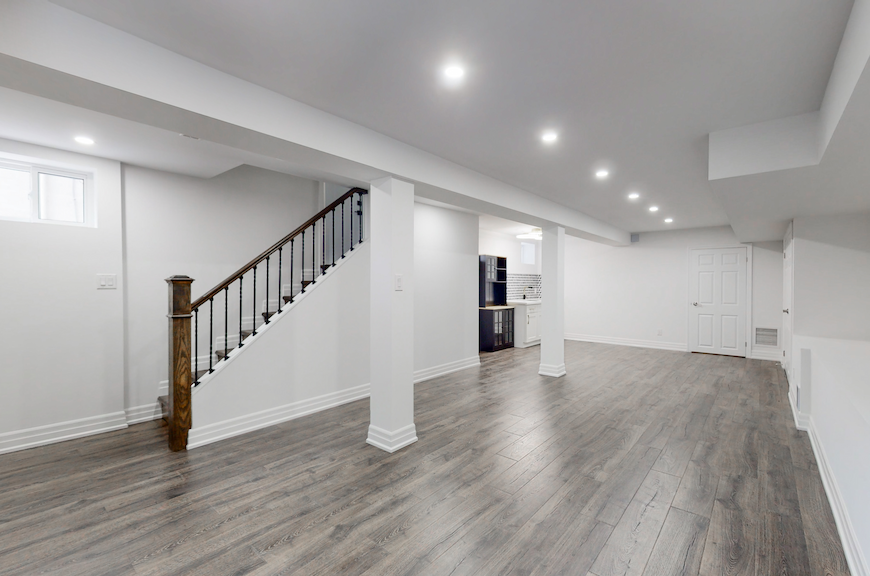
What Is the Ideal Basement Humidity Level in Summer?
According to our experts at CSG Renovation, the recommended summer basement humidity level is between 30% and 50% (a range that provides the best balance between material preservation, comfort, and mold prevention).
At this level, the moisture available in the air and on surfaces is low enough to prevent mold spores from activating and spreading. Additionally, it helps preserve basement materials like wood and drywall by keeping them stable and less prone to warping or decay, and ensures the space feels breathable and healthy for occupants.
Conversely, humidity levels above 60% increase musty odors and microbial activity, cause rust on metal, damage stored books and fabrics, cause wood to rot, and reduce air quality as moisture supports airborne allergen circulation.
Excess humidity also creates a mold, dust mites, and mildew breeding environment and promotes condensation on cold surfaces like foundation walls or HVAC ducts. Levels that are too low (below 30%) can cause materials such as wood to dry out and crack, adhesives to weaken, and one may experience irritation to skin, eyes, and throat when the air is too dry.
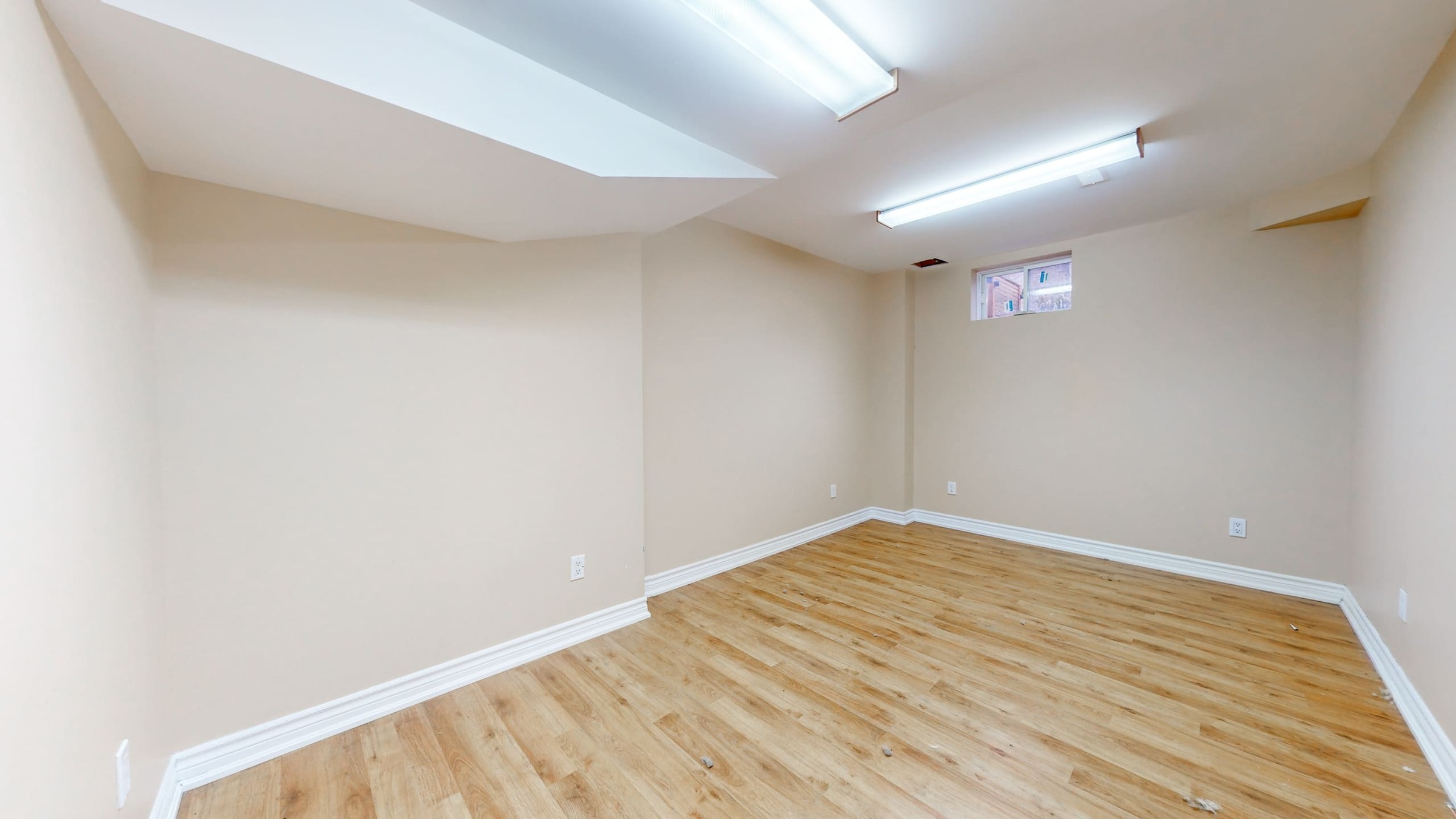
Why Summer Humidity Is a Special Concern in Toronto
Toronto often experiences consistently hot, humid summers, especially between June and September, with average daytime highs ranging from 25℃ to 30℃, combined with frequent rainstorms, which place basements at higher risk for moisture-related problems
When the outside humid air finds its way into a basement, be it through foundation cracks, air leaks, or open windows, it eventually reaches the cooler basement surfaces, including exposed pipes, walls, and floors. When the warm, humid air cools, it loses its ability to hold moisture, and condensation begins to form on the basement surface, thus creating damp conditions/damp basement symptoms.
In addition, the frequent summer rainstorms lead to water pressure building up around the foundation walls of a basement, especially if waterproofing is inadequate. Also, if clogged tiles exist or foundation cracks are present, moisture may sweep into the basement through capillary action, raising the relative humidity, which then creates ideal conditions for mold.
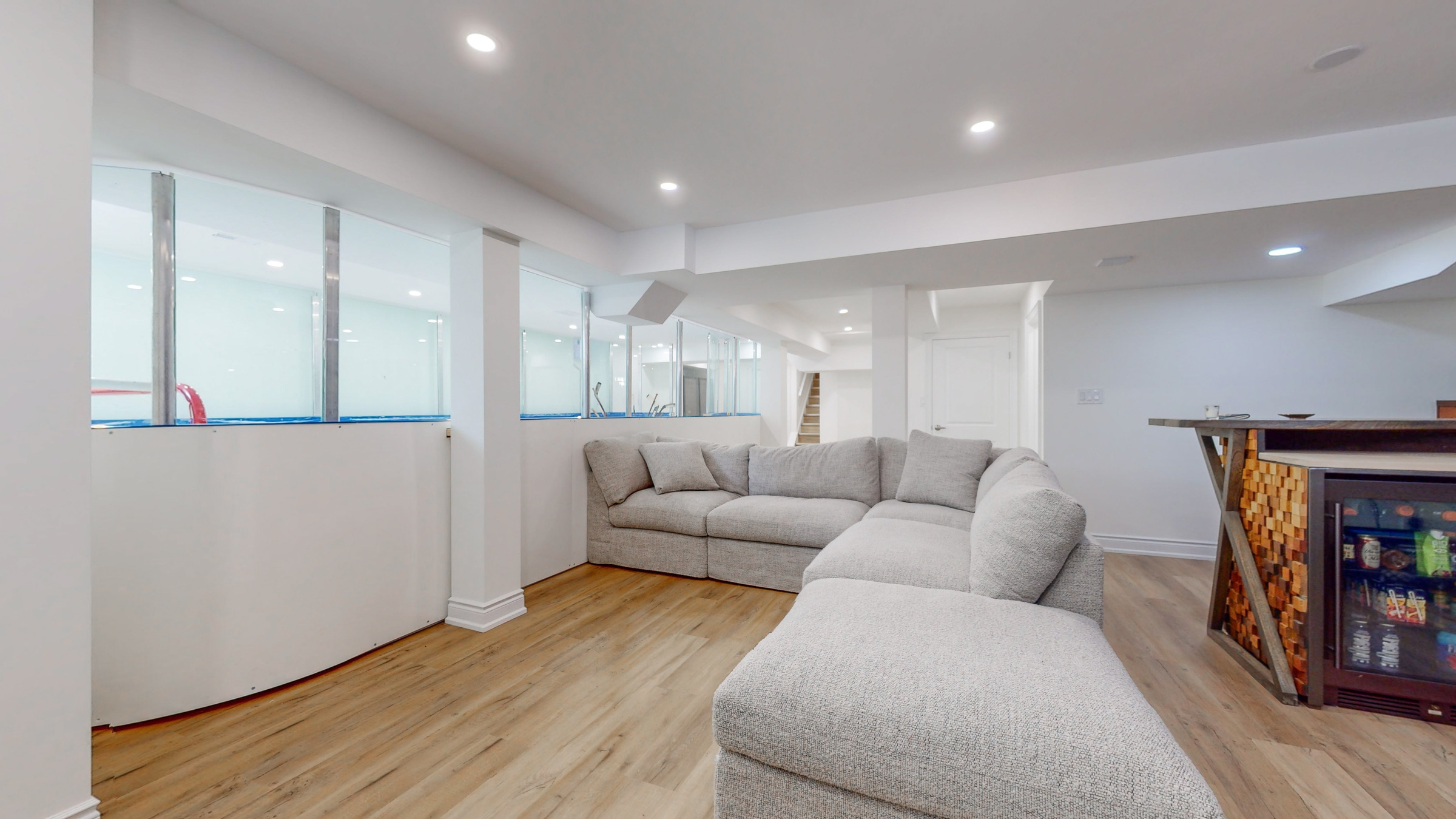
How to Measure Basement Humidity
As part of CSG Renovation consultations, one of the first things we do is assess your basement’s humidity levels, which gives us insights into the overall air quality of the space, moisture risks, and hidden issues such as mold and dampness that may be forming behind walls and under floors.
This is to say that before any effective solution can be recommended, you need to get accurate readings of the current humidity conditions of your basement, and you can do this yourself using a device called a hygrometer. It is affordable, easy to use, and ensures you get real-time insight into the amount of moisture in the air in percentage form.
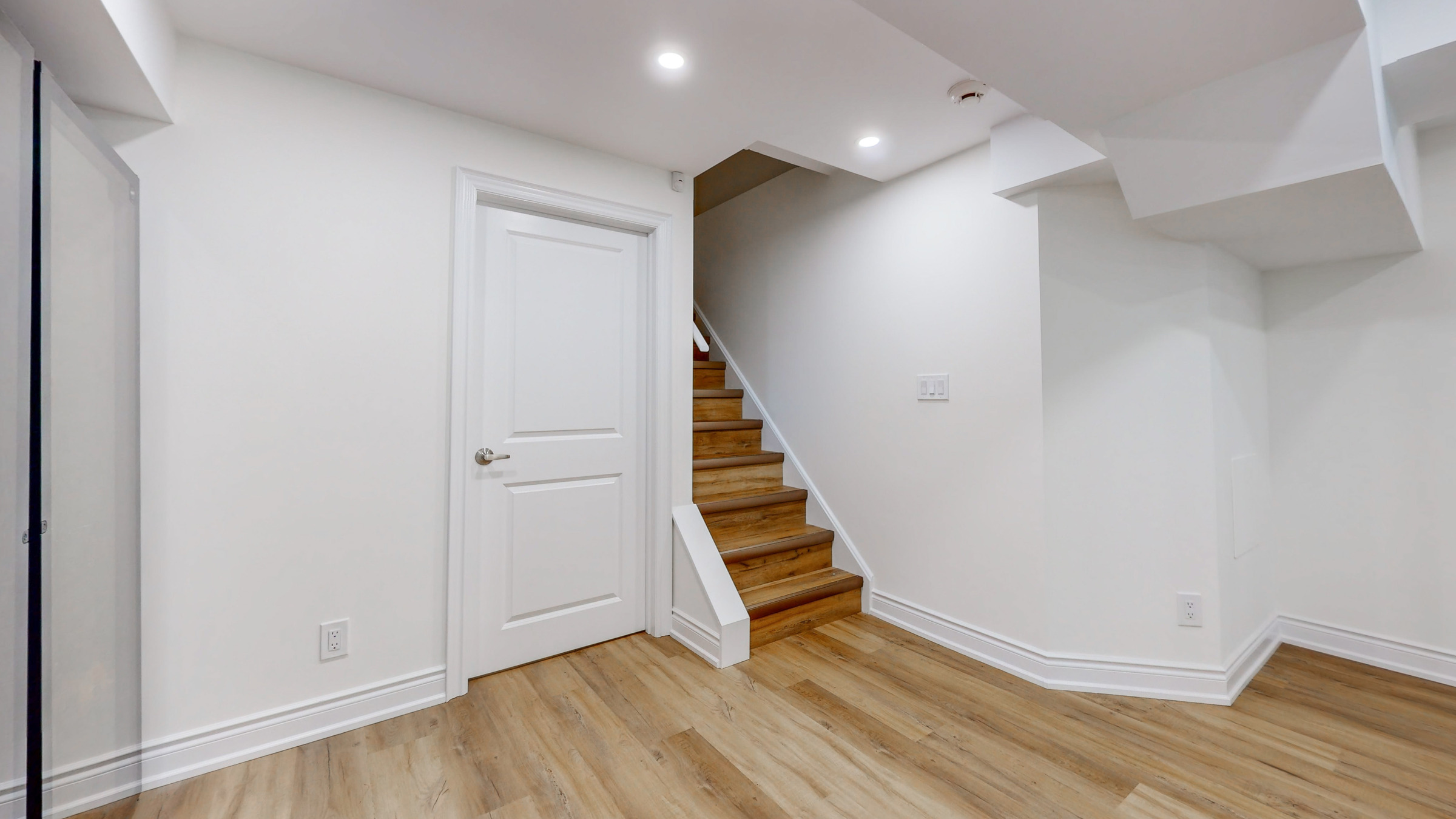
Practical Tips to Control Basement Humidity in Summer
- Use a basement dehumidifier: It helps remove excess moisture, especially when the air is naturally humid. Put the dehumidifier near the center of the basement or where humidity is the highest, like below-ground walls, and ensure there is enough space around it for airflow regulation.
- Ensure proper ventilation and air circulation: Open basement windows on drier days when outdoor humidity is low, use oscillating fans, or install ventilation grilles to promote cross airflow. If you don’t have windows in your basement, consider a basement walkout.
- Install a sump pump or waterproofing systems if there’s water intrusion: A sump pump is ideal for collecting groundwater and discharging it safely outside. Basement waterproofing membranes, interior weeping tile, and French drains will also help deal with chronic water entry.
- Consider insulated flooring and vapor barriers: Our team at CSG Renovation installs foam board subfloor systems into your basement to insulate the floor from moist concrete and cold. Adding vapor barriers like specialty membranes or poly sheeting beneath flooring or behind walls will prevent moisture from seeping into your living space.
- Seal foundation cracks or leaks in walls: Use hydraulic cement, professional foundation sealing, or polyurethane sealants to seal both minor and extensive cracks and moisture problems caused by humid outdoor air and rainwater.
- Maintain HVAC systems and consider running A/C in the basement: Clean and leave open basement ducts and HVAC vents to prevent humidity from climbing fast, and run the A/C fan to allow air to move through the basement even on cooler days.
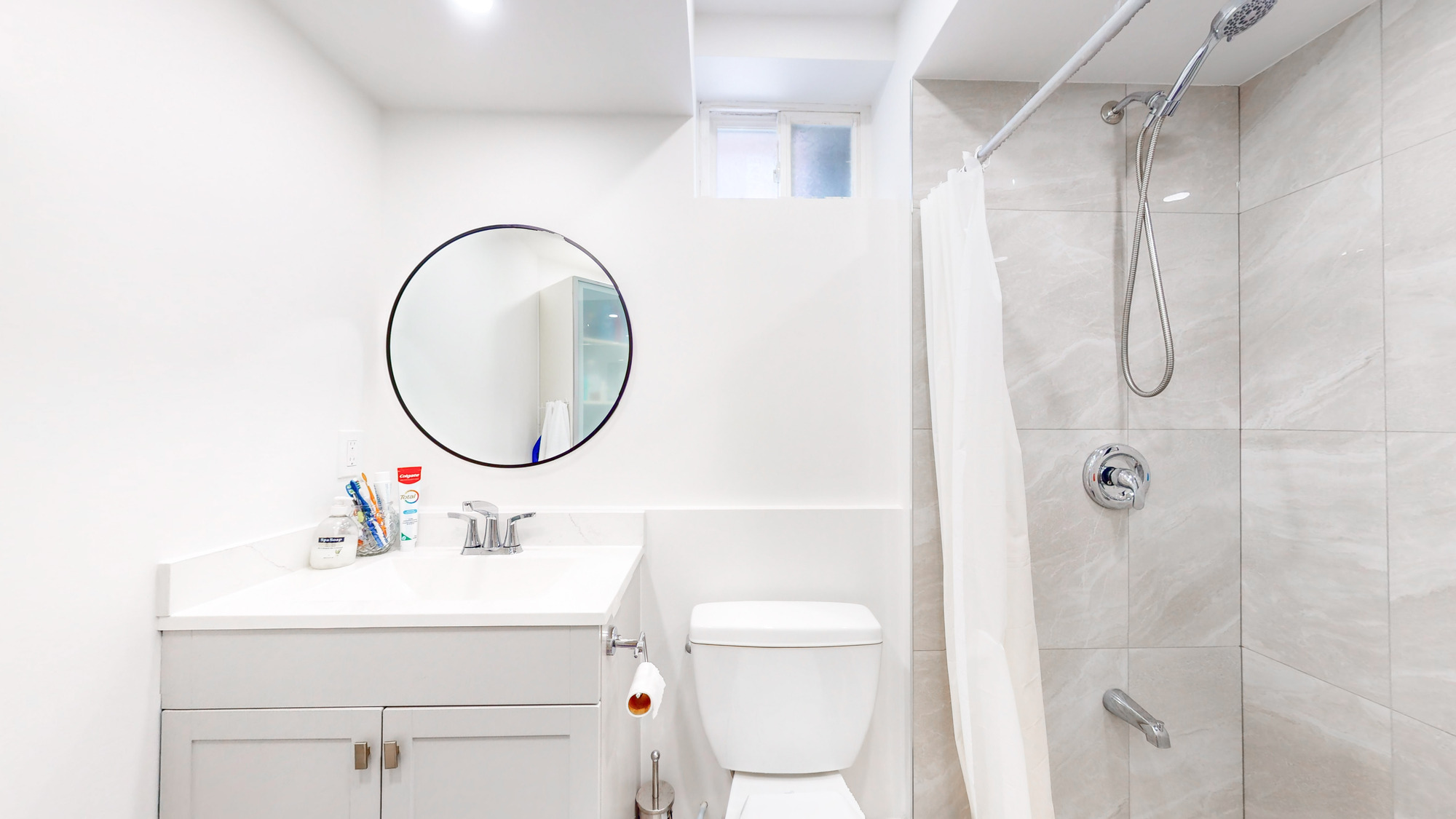
Renovation Solutions that Help Regulate Humidity
At CSG Renovation, we approach every basement renovation with long-term moisture protection in mind. We use materials specifically designed to resist moisture, such as:
- Subfloor systems (like DRIcoreⓇ) and insulated subfloor panels to allow and improve air circulation while providing a moisture barrier, especially in cold and damp basements.
- Mold-resistant drywall alternatives (including cement boards) for moisture absorption and mold growth in the basement.
- Waterproof paints (like epoxy) and sealants (like elastomeric) on both floors and walls, whereby we apply coatings that lock out moisture, hence helping reduce humidity absorption through porous concrete.
The design and layout of your basement matter when it comes to regulating humidity and air movement. Open-concept layouts allow better air flow, thus reducing the chances of damp and stale air accumulating in closed-off areas or corners of your basement.
Proper insulation in floors and walls helps create a basement temperature buffer that ensures condensation is minimized. Based on our past basement renovation projects, opening up a basement space and insulating the foundation walls with rigid foam boards brings about a 15% drop in average humidity even before installing a dehumidifier.
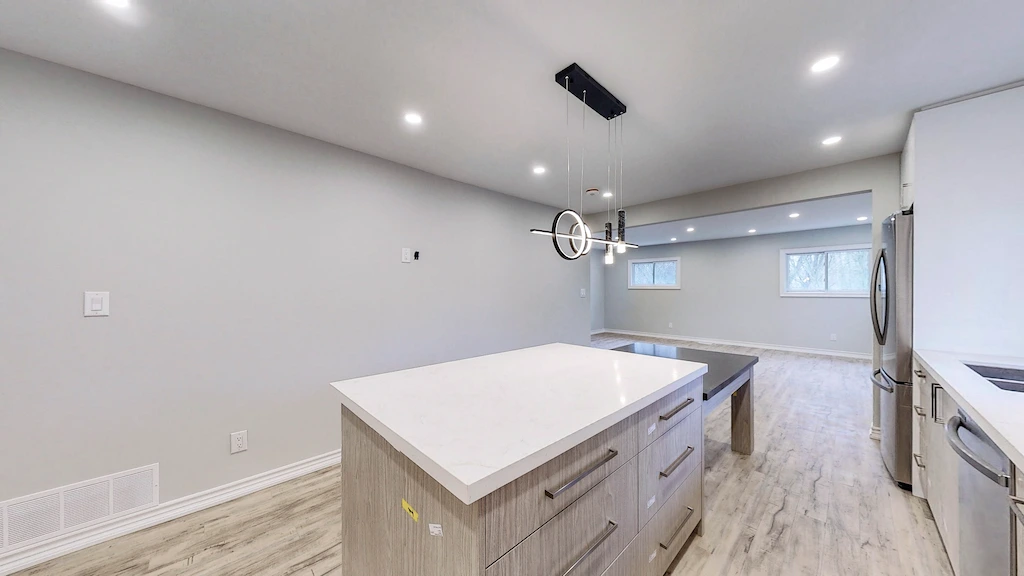
When to Call a Professional
Some of the warning signs that you shouldn’t ignore and that need you to call experts to address their root cause instead of relying on temporary fixes include:
- Warped flooring is an indication that moisture is trapped underneath your basement’s flooring materials or is probably seeping up from below.
- Dampness that is persistent, no matter which season it is, shows that you should consider seeking help from experts to control the humidity levels in your space.
- Musty smell. This is a clear sign that there is a presence of mold or mildew either in hidden sections of your basement or in some corners.
- Mold that is visible, mostly seen on walls, near the edges of your floor, or behind your furniture pieces, meaning that the levels of moisture in your basement are excessive.
Working with experienced contractors like CSG Renovation ensures the right steps are followed to implement humidity control measures in your basement!
We bring a trained expert, advanced tools like hygrometers, and access to high-quality moisture-resistant materials that you may not have. We encourage you to always monitor your basement, take action as early as you notice humidity issues to prevent bigger and costlier damage, and contact us at (647)428-0007 for a free basement assessment or consultation.
Frequently Asked Questions
Yes. High humidity, especially above 60%, can cause corrosion of electronics, rusting of metal, warping of wooden furniture, and mold growth on clothing, books, and paper.
Use airtight plastic containers or vacuum bags to store valuable items, and keep electronics on shelves with a dehumidifier running nearby.
External sources: dampness on walls after rain, water stains near cracks in the foundation, condensation around basement windows, musty odors.
Internal sources: humidity rises sharply when you do laundry, take a shower, use the kitchen, and there is constant condensation on cold water pipes.
Tracking humidity with a hygrometer before and after rain will help you get more accurate data.
Most Canadian home insurance policies do not cover gradual damage caused by moisture, mold, or condensation. If high humidity leads to mold growth or damage to stored items, you may be liable for the associated costs.
Some insurers offer additional coverage for water intrusion, but not for moisture in the air.
A damp basement raises suspicions during an inspection. Buyers may assume there are water problems, which will lead to lower offers or a delay in the sale. On the other hand, a dry, well-maintained basement inspires confidence and increases resale value.
Yes, when exposed to summer humidity, we recommend vinyl planks (LVP), ceramic tile, and sealed concrete. These are resistant to moisture and mold growth.
We advise avoiding solid wood and traditional carpet, because these can warp or trap mold.
- Hot summer weather (heat waves or very humid days): check every 1–2 days.
- Rainy season or after heavy rainfall: daily for several days after rain.
- Normal summer weeks (without heat waves or heavy rainfall): once a week is sufficient.
- Cold weather/winter: check once a month.
Alternatively, you can install a digital hygrometer at basement level that sends notifications to your phone if the humidity level rises above 60%.
In finished basements, air gets trapped behind walls and floors, allowing mold to grow unnoticed. Use heating, ventilation, and air conditioning systems.
In unfinished basements, exposed concrete can release moisture, but air exchange is usually better. Seal cracks, insulate cold pipes, and use a stand-alone dehumidifier.
Absolutely.
For example, insulation using unsuitable materials or without vapor barrier can lead to condensation buildup behind walls, which promotes mold growth.
Not always. Air conditioners do remove some moisture, but they often run less frequently in basements because the air there is naturally cooler. This means less dehumidification.
For most homes, basement finishing is necessary, especially during humid summers in Ontario, Quebec, or Atlantic Canada.
- Maintain HVAC systems: clean or replace filters, empty and disinfect water tanks, check drain hoses for clogs.
- Check windows and vents: reseal anything that has shrunk over the winter, clean debris from window wells.
- Check sump pumps and floor drains: test pumps by pouring water into them.
- Clean gutters and downspouts.
- Start using a dehumidifier on low settings when humidity is above 50%.
30–50% throughout the year. This is a comfortable microclimate that prevents mold growth. If the humidity consistently exceeds 60%, mold spores can become active within 24–48 hours.
In most cases, 50% is a safe level. Mold growth usually requires constant humidity above 60%. However, if you have hidden leaks or surfaces that never dry completely, mold can appear locally even at 50% humidity.
At 70% humidity, mold is almost guaranteed to appear, wood will swell, and stored items will quickly deteriorate.
With such high humidity, you need a basement renovation for insulation and moisture removal systems.

